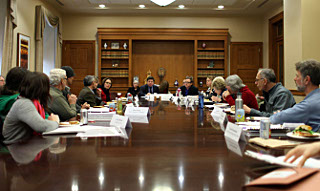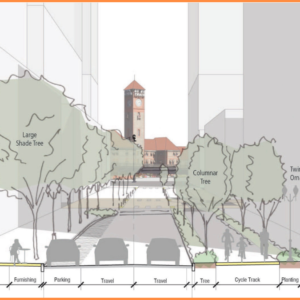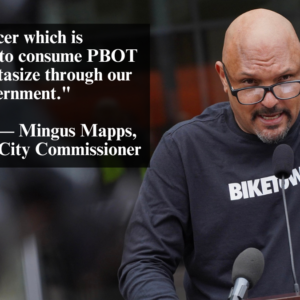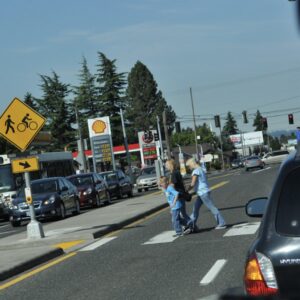
conversation about transportation budgets.
(Photo: City of Portland.)
The City of Portland is getting ready to write its most important transportation wish list in years.
A trio of town halls next month — one east of Interstate 205, one in outer Southwest Portland and one in middle Southeast — will help determine which projects the city will publicly commit to when it proposes a new revenue plan to the public.
As we first reported last month, the city’s leading option is a per-household and per-business “street fee” that would probably come out to several dollars per month per household. City Transportation Budget Advisory Committee Member David Hampsten said this month that the city’s goal is to raise about $25 million a year to spend on street repairs, sidewalks, safer crossings, multi-use paths and other amenities.
Earlier this month, Mayor Charlie Hales and Transportation Commissioner Steve Novick convened an impressive 27-person committee expected to help select the projects, determine the fee structure and ultimately make the case to the public.
The city’s preliminary project lists so far have not included the word “bicycle,” though mixed-use paths such as the North Portland Greenway and various measures in the East Portland in Motion plan would certainly improve bike transportation.
Hales, Novick and city transportation staff will attend the three town halls “to discuss current unfunded transportation needs,” the city wrote on its website this weekend:
- Thursday, Feb. 20, 6:30 to 8:30 p.m. at Sunnyside Environmental School, 3421 SE Salmon St.
- Tuesday, Feb. 25, 6:30 to 8:30 at Immigrant & Refuge Community Organization (IRCO), 10301 NE Glisan St.
- Thursday, Feb. 27, 6:30 to 8:30 p.m., Multnomah Arts Center, 7688 SW Capitol Highway
Mark Lear, who staffed the transportation bureau’s similar “Safe, Sound and Green” street fee effort in 2007, is returning as the city’s point person on this project. You can contact him at (503) 823-7604 or mark.lear@portlandoregon.gov.
Update 10 pm: City spokesman Dylan Rivera emails to emphasize that the city is approaching the process with an open mind and may well end up pursuing an option other than the street fee, or a higher or lower amount of money, based on public input.
“We have not decided on a specific amount or a specific collection method,” Rivera said. “It is true that there was a 2007 proposal that would have raised $25 million a year with a street fee. It’s also true that the City Auditor said we would need an additional $75 million a year over the next 10 years just to bring the pavement on our streets up to decent condition.”
Also, a clarification that is now added above: The city’s working target of $25 million, cited in this post and one earlier this month, comes from Portland Bureau of Transportation Budget Advisory Committee member David Hampsten of the East Portland Neighborhood Office, a longtime budget volunteer who’s been following the process closely.







Thanks for reading.
BikePortland has served this community with independent community journalism since 2005. We rely on subscriptions from readers like you to survive. Your financial support is vital in keeping this valuable resource alive and well.
Please subscribe today to strengthen and expand our work.
Why is the city so intent on pushing through a new property tax that will do little to help address their street maintenance funding woes? If they want to do something obviously politically unpopular, they ought to at least make it worth the time and effort. This is ridiculous.
Except it’s not a tax on property.
Ever looked into how much is proposed and how much it would generate?
PBOT usually links such funding to specific projects, and if you show up, you could insist on it.
It does seem strange to me that this issue has been studied, tested, bandied about city hall and PBOT for, what 7 years now(?) and it is still so ill-defined & flawed (raises a pitiful amount; requires some additional expense to raise and track the funds raised–especially if as we’ve heard it might be a tiered rate rather than a flat fee; and does not discourage the activity which is what has put us in the hole we’re in: driving). Yikes is right.
How much staff time has already gone into this? And to what end?
Pandora’s box was opened when the art tax passed. Now everyone who needs $$ to fill in their fuding gap will try to do a household fee. yikes
In ten years there will probably be seven different taxes with seven different due dates. I’ll have to put a reminder on my calender when the All Children Should Be Loved Tax is due.
It’s still a regressive tax.
Maybe if they sweeten the pot a little with some guarantees. “X” percent of fees go toward bicycle/pedestrian infrastructure (and not just 1%). “Y” percent goes toward paving/sidewalks where it currently is lacking. Special consideration for underserved areas (i.e. east Portland). All road projects benefit community streets and not major arterials.
Though I want to like this, I just can’t. And yes it is another property tax. One in which the owners/occupiers of single family units will take the brunt of. Rental agents can simply push the costs to renters.
Smells too much like the art tax, which was great if your a large arts orginization, not so great for the schools. And considering that the (art tax) money is being “held” untill all the legal BS is cleared up.
If it’s like the art tax, I can see it being bundled in such away that lions share of the money ends up going to Trimet, and perhaps keeping the CRC alive. Of course that would all be in the small print, hidden behind a big bold message in which “the kids” will benifit the most.
I just gotta wonder what ever happened to bond measures? They’ve always worked in the past. Or perhaps they should do a kickstarter….haha.
How do you imagine bonds are paid for? They are paid for by the taxing authority of the juristiction that sells them. Portland would raise property taxes to pay for them, if voters approve the bond.
Gutterbunny: While I agree with your opposition, I’d like to try increase your understanding of public finance and transportation finance in particular.
First, the CRC project, if it goes forward, will be a state/federal/Trimet project with no city money involved. One of the reasons CRC got so expensive is that the city was demanding lots of city and private streets be rebuilt on Hayden Island even though it will primarily benefit developers on Hayden Island. There was never a proposal for the city to contribute anything and the city staff even got paid to participate in the CRC planning effort.
I don’t know if you were joking about bonds, but you should be aware that the OTIA program, begun about 10 years ago to fix bridges throughout the state, was a bond program. The revenue to prepay the bonds over about 20 years was from an increase in driver’s license and vehicle license fees to be collected for 20 or so years. Those future receipts were all pledged to repayment of Oregon bonds. That’s why there is little money for ODOT for the future. Also, be aware that the gas tax collected by the state is shared with cities and counties. Until OIA, Oregon had basically operated on a pay-as-you-build approach.
That said, I’m definitely opposed to the city’s proposed utility fee. I favor a gas tax increase that would bring the state and federal gas taxes up to their inflation-adjusted values based on the taxes from 1993, the last year the federal gas tax was increased. I view the proposed utility fee as a way for Portland homeowners and renters to subsidize motorists, including the huge number of non-Portland resident motorists who use Portland roads.
Thanks for the great post! Can the city. Raise gas taxes or does the state have to?
The city does have legal authority to raise gas taxes … though only on gas sold within the city limits, of course.
Those public comment meetings could not exclude North Portland any more. They are 8, 10 and 11 miles away from downtown Kenton, and further away from St. John’s. For people in N Portland, it is as far to that meeting as it would be for people from Milwaukie/Lake Oswego. Way to snub the people in the 5th quadrant, Portland!
I’ve got a an idea for where some of the money should go.
http://btaoregon.org/blueprint/
For those proposing a gas tax, could you explain how that would work? I found this article in the Oregonian which suggested $0.01/gallon would raise $1M. And as the article suggests, $0.01 is a hard sell. So if we’re looking for $25M, which sounds like a minimum, that would mean $0.25/gallon, though I imagine it would have to be higher than that because people would likely start buying outside the city.
For comparison, OR state gas tax is $0.30/gallon and federal tax is $0.184/gallon.
Just to be clear, I’d be thrilled if the externalities of gas consumption were internalized in its price. It just seems like free market dynamics mixed with the odd psychology we have associated with seeing gas prices in huge signs all over our cityscape would likely make this a hard sell as people compensate by picking up their gas when they take trips to Beaverton/Gresham/Vancouver/etc. I imagine also the increased local prices would mean local gas retailers would be put under severe financial pressure and some would go under.
Seems like handling this at the federal (or at least state) level is the way to go. Looks like Earl Blumenauer is proposing to nearly double the federal rate from $0.184 to $0.334/gallon:
http://www.oregonlive.com/mapes/index.ssf/2013/12/portland_congressman_earl_blum.html
“And as the article suggests, $0.01 is a hard sell.”
The Oregonian argues that a $0.01/gallon tax would be a hard sell?! Well I’ll be darned. Just one more example of the Oregonian being on the wrong side of history. Seems we’ve been seeing lots of examples lately.
But to your larger point, spillover is a problem (in the short run). Though I don’t think this is a reason not to pursue it. Mayors confer about all sorts of things all the time (busting up Occupy encampments, for instance). All municipalities are facing versions of this problem of
(a) no money set aside for maintenance,
(b) price of asphalt rising much faster than just about everything else
(c) real value of gas tax receipts declining rapidly over time
If Multnomah Co. or Portland made a serious stab at raising the gas tax, and not just once, but indexing it to, say, 2x or 3x inflation, and adjacent municipalities saw how much money we were raising, how quickly our problems of financing our transport infrastructure disappeared they’d want in on the action too. Others much smarter than I have looked at this and have come up with strategies for doing this sensibly. For one, Novick et al could lobby at the metro or state level for a real gas tax instead of frittering away public resources chasing down street fee rabbit holes.
“Others much smarter than I have looked at this and have come up with strategies for doing this sensibly.” I would for-real be interested if you can dig up any links.
Oregon was the first state in the nation to levy a tax on gas back in 1919. I would be thrilled if they stepped it up and pushed it to California levels. They pay an extra $0.224/gallon compared to us.
One of the issues to overcome is the perception of fairness. I’m all for internalizing costs as well, but those who might avoid paying the tax by not purchasing fuel will continue to have to argue with those that pay about what the money should be spent on. It boils down to the frame of ‘roads’ versus ‘transportation’ and the payors will justifiably argue that the bulk of the funds should go to the payors mode of choice. If you want the funds divided by mode you will need to have a funding mechanism that approaches neutrality in regards to mode. A per-household fee for ‘transportation improvements’ (like many of Portland’s neighboring jurisdictions already have), can be justifiably divided by mode use. This could even be reflected down to the district or neighborhood coalition level. Imagine 16%-20% of inner eastside revenue going towards bicycle infrastructure (matching the current mode share). In many parts of Portland, such a mode based division of revenue would significantly increase funds spent on sidewalks and bike routes.
Yeah, the more I think about this the more it seems to me that we need two different buckets:
1. street repair/maintenance
– Fund it with gas tax and/or VMT tax and/or weight of vehicle and/or increased parking fees. Something that tries to tease out the physical damage that riding around in a one- or two-ton vehicle does to our city streets.
2. safety improvements, sidewalks, multi-use paths, etc.
– Fund it with a per-household and per-business “street fee” as proposed.
“2. safety improvements, sidewalks, multi-use paths, etc.
– Fund it with a per-household and per-business “street fee” as proposed.”
Except that those items you list in (2.) are derivative of the ubiquity of the automobile on our streets. I’m not seeing why a gas tax wouldn’t be a very appropriate way to pay for those as well.
I had originally written to this point but edited it out. I think it’s a really hard sell: to suggest that those who drive should have to entirely shoulder the burden of paying for MUPs, sidewalks and the like. We’re all pedestrians, shouldn’t we all have to pay for sidewalks?
“We’re all pedestrians, shouldn’t we all have to pay for sidewalks?”
I hear you, but it is my understanding that in places without cars sidewalks do not exist, have no meaning. Post car we’ll have to divvy up how to fund our streets and roads another way, but it will all be so different (hauling asphalt with horses, etc.) that I don’t think we need to trouble ourselves with that in this round.
I’m looking. In the meantime a little nugget:
“The gas tax is a perfect tax. It’s not invasive on the person using it and it requires very little effort on the agency that depends on that money for providing services,” says Olson. “Trying to replace that is really difficult, because anything you try to do is so much more complicated than just pulling up to the pump and paying for gas.”
Olson is Mary Olson, (former? ) Oregon Transportation Commission member
How about raising fees and increasing times for parking on the street, taxing the surface parking lots, adding a large fee to studded tires, raising vehicle registration per vehicle weight, adding extra fees for older vehicles that cannot meet emissions standards.
I realize we need more money, but the City should seek ways of decreasing damaging inputs to the system while raising the money, getting a two-fer.
Michael,
Bike Portland reported on this earlier, saying Hales was assembling a “Sales Team” for the per household street fee. Is this group a sales team, or are they genuinely identifying transportation needs and their cost and are seeking ways to pay for that?
‘Sales team’ was Steph Routh’s phrase and it was definitely breezy in tone. My guess is that everybody who shows up is doing so with an understanding that they’re all going to agree on something, and once they do they’re all going to help push it. There may be a few who jump off the boat, but there’s broad consensus among these organizations that more transportation money is needed.
thanks for clarifying